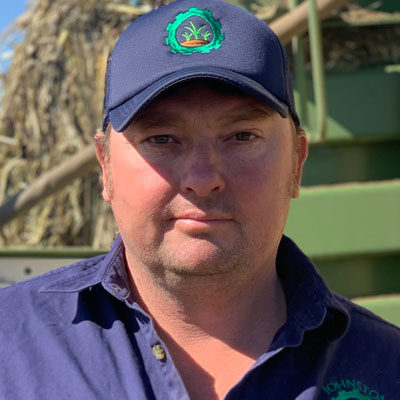
Brad Johnston
Regional Winner | Productivity category
Quandialla, NSW
Brad Johnston is a grain and livestock grower and a 2020 Growth Awards Regional Winner in the Productivity category. Read on to learn more about Brad.
What’s the one thing you have done in your career you are most proud of?
Diversifying our farm operation has been key to our success and it’s something I am proud of. In the past decade, we have moved away from a total cropping enterprise to include hay, straw and cattle. When you are 100 per cent cropping, it can be hard to ride out the highs and lows, the droughts and floods. We went into hay making to try to level out our cash flow, and we now supply a feedlot in Dalby, Queensland. We also bought trucks and carry fertiliser, and can do contract spreading for other farmers. Having a range of enterprises helps with evening out cash flow and makes the business as a whole more resilient.
How will you share what you learn with others in the industry?
Given our large range of enterprises, I talk to a lot of different people and I like to gain their knowledge and share any insights I might have. Any lessons learned from the Syngenta experience would be shared with my large network of contacts – everyone from feedlot operators to hay makers to people I spread fertiliser for to fellow farmers. Everyone learns so much from listening to other. You might not use that information straight away but that discussion might come back to you in two or 12 months’ time and be helpful to your business.
After diversifying our business and then selling all the fodder, straw and grain we could make, it’s time for consolidation. It took me several years to understand that it is okay to not sell everything you make straight away. Consolidating supplies of grain and hay and straw will act as a type of income insurance policy for our business. We can tuck hay or straw or grain away in a shed, make sure that it is stored well, and then have that sitting there when we need cash flow.
What is the biggest barrier to achieving success in the next 12 months?
The ability to hold onto good staff could be a barrier to success. With the COVID-19 pandemic, some people are less willing to work when they know they can be paid by the government through schemes. It is important to make sure staff are happy in their workplace. It’s a long drag if you are not happy at work and don’t enjoy what you are doing. We have eight permanent staff and a few casuals around harvest and we are hoping that they will still be able to come to work with us given border closures.
What is the biggest challenge Australian Ag has to overcome in the next 10 years?
The influence of corporate farming in the agricultural world is a challenge for the industry. I am a big believer in family farms and the ability to pass on knowledge from one generation to the next. My father died suddenly in January and I am only now realising the knowledge he had and the things he did. I don’t think this knowledge transfer happens as much with corporate farming and certainly there seems to be too many employment layers in there, which could make them uneconomic. There are things that family farms will get done on the weekends with family members that don’t happen in the corporate world. Family farms could also be the only way for young people to get a start in agriculture. Land prices are so high that it is virtually impossible for those without good backing to get into the industry. There is nothing better than working for yourself and achieving your goals working alongside your family. And despite all the challenges, I like to follow my late father’s expression of “just lean forward and keep going”.